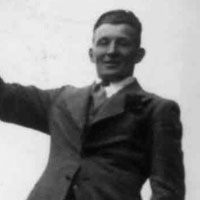Sam Cowan

Born: Chesterfield 10th May 1901 Died: Haywards Heath, 4th October 1964
2nd December 1946 - 30th June 1947
When Sam Cowan arrived as manager in December 1946 supporters and the media were delighted with the appointment. Cowan had been City’s great captain during the 1930s Cup runs and according to the Sunday People: “Cowan was the most popular player ever at Maine Road. If the City followers give him the same support now he will be a happy and successful manager.”
“It will not be an easy job. The team have rarely played like a promotion side this season, and there are obvious weaknesses. But if Cowan, the manager, can put into City the spirit he put into them as club captain, Newcastle and other leading Second Division clubs may be shocked.”
Although Cowan’s salary, quoted as £2,000, was a substantial amount at the time the move to Maine Road was a major gamble. He had been acting as trainer to Brighton & Hove Albion and had also set up his own physiotherapy business on the south coast. In addition, he had a young son and the family were settled in the Brighton area. Because of this City agreed that Cowan could continue to live in the south, but would be expected to be in Manchester and with the team from midweek through to after the game. It was an unusual step, but City were well aware of the progress ex-Blue Matt Busby was starting to see at United, and felt that Cowan was a much better tactician and leader of men.
Cowan’s influence was felt immediately with his first match ending in a 3-0 win at Newport County and his first maine Road game ending 5-1 against Barnsley. After the New Year’s Day 4-0 victory over Fulham journalist Tom Rudd wrote: “Seven matches without defeat is Manchester City’s fine record since Sam Cowan relinquished his post as trainer to Brighton & Hove Albion to manage the affairs of the City. Cowan seems to have altered the team’s midfield tactics. On their form yesterday the City will walk into the First Division.”
Cowan’s side did walk into the First Division as Division Two Champions, with only four of the 30 League and Cup games he managed ending in defeat. Sadly, behind the scenes there had been some friction. Cowan, according to journalists during the summer, had never been afraid to speak his mind and it seems he was in conflict with Chairman Robert Smith as a result. One journalist stated: “Sam took a strong line on some matters and the board viewed things in a different light. Managing big soccer clubs is one of the hardest jobs in life. Happiness and success depends largely on one’s ability to recognise that directors are, after all, the bosses. Sam always practised straight talking, but often diplomacy can win greater points.”
Cowan resigned after only seven months as manager. He told the Daily Herald newspaper: “Something happened, and I felt I had no option but to hand in my resignation. I don’t want to implicate anyone, so rather than cause any trouble I would prefer to leave the matter there.” When he was pushed for information he added: “The trouble had nothing to do with players, transfers, or salary. I was allowed to carry out any ideas I had up to a point and any suggestions I made were considered.” I can look back with pride on my first experience as manager. I made the winning move in the Championship race by switching McDowall from left-half to centre-half and introducing Fagan into the first team. I also created a lot of harmony among the players where there had been none previous to my coming.”
During the years that followed Club officials suggested that Sam’s commuting from Brighton was the issue, however it’s clear that performances on the pitch had not been affected. Whatever the truth it’s clear that City lost a very capable and well loved manager. Cowan’s departure was the first time a City manager’s resignation had upset the majority of fans. They were convinced great success would come under Cowan, but his resignation, whether forced or not, caused many fans to question the direction of the Club at a time when popular ex-Blue Matt Busby was guiding Maine Road’s tenants Manchester United towards success. This was a testing time for supporter loyalty.
After City Cowan developed his physiotherapy business and became masseur to Sussex CCC and in 1962-3 he went on tour with the MCC to Australia. Earlier, in 1955, he helped Newcastle United as part of their stay on the south coast to prepare for their Cup Final meeting with City.
Cowan died at Haywards Heath while refereeing a charity match featuring television and film stars of the period, such as Tommy Steele, on 4th October 1964.
All history and statistical material has been produced based on the research and writing of Manchester football historian Gary James (www.facebook.com/GaryJames4). It is maintained by Ric Turner & Gary James. All text remains the copyright of the original contributors.
Gary's book, Manchester - the City Years: Tracing the Story of Manchester City from the 1860s to the Modern Day, is available to order on Amazon.